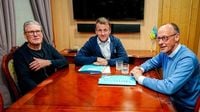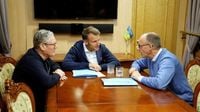In a significant show of unity, European leaders are set to visit Kyiv on Saturday, May 10, 2025, to meet with Ukrainian President Volodymyr Selenskyj. This historic visit includes Bundeskanzler Friedrich Merz of Germany, French President Emmanuel Macron, British Prime Minister Keir Starmer, and Polish President Donald Tusk, who aim to express unwavering support for Ukraine amidst its ongoing conflict with Russia.
The leaders’ primary objective is to reinforce calls for a 30-day ceasefire, a proposal backed by U.S. President Donald Trump, to facilitate peace talks. Their joint statement emphasizes the importance of creating a conducive environment for negotiations, aiming for a "just and lasting peace" in the region. The leaders assert, "The bloodshed must end. Russia must end its illegal war of aggression, and Ukraine must be enabled to develop as a sovereign nation within its internationally recognized borders, also for coming generations." This statement highlights their commitment to Ukraine's territorial integrity and sovereignty.
During their journey, the leaders plan to lay wreaths on the Maidan in honor of fallen Ukrainian soldiers and victims of the Russian invasion, a poignant gesture reflecting their solidarity with the Ukrainian people. As they prepare for their meeting with Selenskyj, they also intend to discuss the technical aspects of implementing the ceasefire and the groundwork for a comprehensive peace agreement.
Merz, who coordinated this visit with Trump, expressed optimism about achieving a ceasefire agreement over the weekend, stating, "I have great hope that there will be an agreement for a ceasefire in the Ukraine over this weekend." His remarks come amid increasing pressure on Russia, which currently occupies approximately 20 percent of Ukrainian territory. The leaders collectively agreed to escalate pressure on Russia's military operations until a permanent ceasefire is established.
This visit marks a significant moment in European diplomacy, as it is the first time that the leaders of Germany, France, Poland, and the United Kingdom have come together in this capacity to support Ukraine. The collaboration underscores a renewed commitment among European nations to work alongside the United States in addressing the crisis.
In recent months, Trump has faced challenges in his attempts to mediate peace, often working unilaterally. However, this joint initiative signals a potential shift towards a more coordinated approach between the U.S. and Europe in seeking an end to the conflict. The leaders' statement also categorically rejects any territorial concessions to Russia, affirming that Ukraine's sovereignty must be respected.
Merz, Macron, Starmer, and Tusk's journey to Kyiv follows a series of preparatory discussions, including a recent phone call between Merz and Trump, where they aligned on strategies to enhance support for Ukraine. The leaders are also expected to convene a virtual meeting with the "Coalition of the Willing," a group of approximately 30 nations committed to supporting Ukraine, which includes prominent European states and NATO representatives.
As the situation in Ukraine remains fluid, the European leaders are prepared to offer additional military assistance to bolster Ukraine's defenses against ongoing Russian aggression. The commitment to increase military support reflects a broader strategy to ensure that Ukraine can withstand the pressures of war and maintain its sovereignty.
In light of the recent escalation in hostilities, the leaders' visit to Kyiv serves not only as a show of solidarity but also as a strategic maneuver to apply diplomatic pressure on Russia. Their collective stance aims to send a clear message: the international community stands firmly behind Ukraine and will not tolerate further aggression.
The timing of the visit is particularly symbolic, coinciding with the 80th anniversary of Russia's victory over Nazi Germany, a historical moment that underscores the importance of unity in the face of tyranny. By standing together in Kyiv, the leaders hope to inspire a renewed commitment to peace and cooperation among European nations and their allies.
Ultimately, the success of this diplomatic mission hinges on Russia's response to the calls for a ceasefire and renewed peace negotiations. As the world watches closely, the leaders' efforts may pave the way for a significant turning point in the ongoing conflict, fostering hope for a resolution that respects Ukraine's sovereignty and promotes lasting peace in the region.






